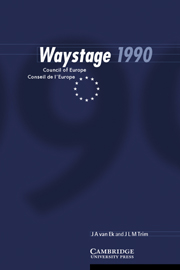Book contents
- Frontmatter
- Contents
- Preface
- Introduction
- 1 The objective: description
- 2 Components of the specification
- 3 Language functions
- 4 General notions
- 5 Themes and specific notions
- 6 Dealing with texts: reading and listening
- 7 Writing
- 8 Sociocultural competence
- 9 Verbal exchange patterns
- 10 Compensation strategies
- 11 Learning to learn
- 12 Degree of skill
- APPENDICES
Introduction
Published online by Cambridge University Press: 01 March 2010
- Frontmatter
- Contents
- Preface
- Introduction
- 1 The objective: description
- 2 Components of the specification
- 3 Language functions
- 4 General notions
- 5 Themes and specific notions
- 6 Dealing with texts: reading and listening
- 7 Writing
- 8 Sociocultural competence
- 9 Verbal exchange patterns
- 10 Compensation strategies
- 11 Learning to learn
- 12 Degree of skill
- APPENDICES
Summary
Target population and relation to Threshold 1990
Waystage 1990 is an early learning objective designed for those who are interested in acquiring a general basic ability in English but who are unable or unwilling to commit themselves from the outset to an expenditure of time and energy that would take them to the level of competence described in a separate publication called Threshold 1990.
Any learning objective is necessarily based on considerations of desirability and feasibility, the latter aspect providing the limits of the extent to which the former can be realised. What is, in our view, desirable for learners to be able to do in and with the foreign language, so as to be in a position to achieve the full mobility that a command of English may provide, is described by us in Threshold 1990. It has to be recognised, however, that for many beginning learners – and particularly for those with (only) little educational experience – the feasibility of mastering the learning load represented by that objective may seem to be very doubtful indeed. At the same time it cannot be denied that the achievement of a lower level of ability than threshold level might be of considerable value to them. Rather than deterring these potential learners by asking them to set their sights higher than they would consider to be reasonable, we would propose to them a reduced learning load of a weight which past experience has indicated to be generally acceptable and also manageable within a comparatively short time.
- Type
- Chapter
- Information
- Waystage 1990Council of Europe Conseil de l'Europe, pp. 4 - 9Publisher: Cambridge University PressPrint publication year: 1999



